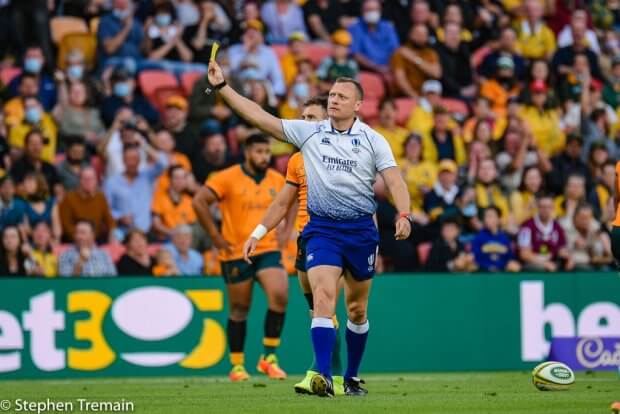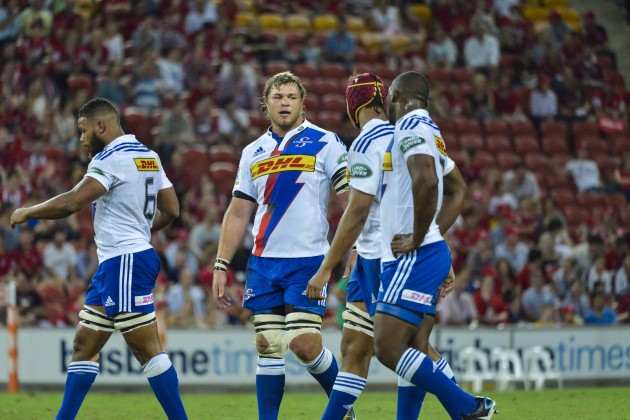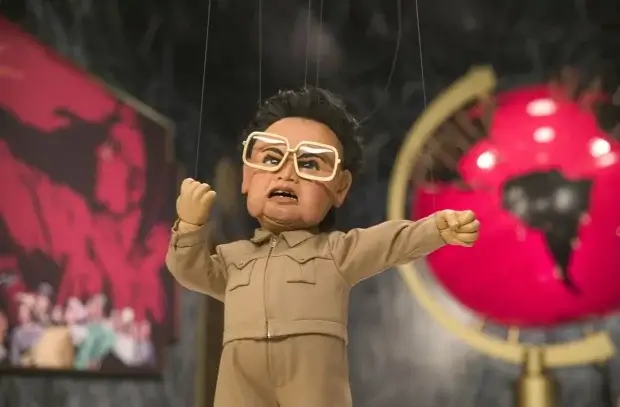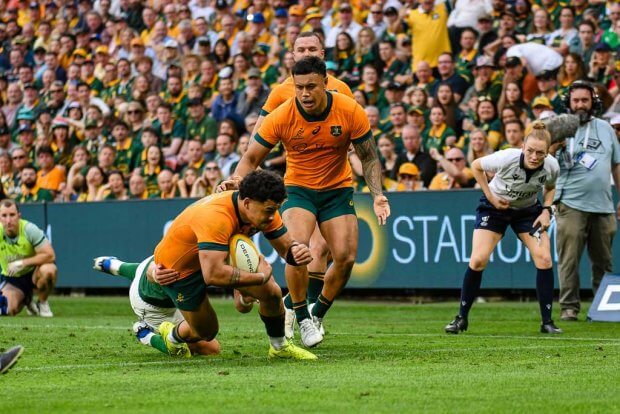Wednesday’s Rugby News sees Wallaby discipline under the microscope, Jake White bemoans the loss of Australia’s academy systems, Vermeulen tells us what we already knew and a special “Commie Watch” alert.
43 cards in 47 Tests: Wallabies could make it easier for maths fans

Iain Payten of the SMH reports that the plainest tale of the Wallabies’ defeat in Brisbane for the Wallabies can be traced to the same place it is now always found: the column labelled “Discipline”.
Be it via penalty counts or yellow and red cards, the Wallabies’ discipline has been intractably bad for around three years now and the Suncorp Stadium defeat was more of the same. The penalty count ended up 15-12 against Australia – after being 8-2 in the first half – and yet again the Wallabies played with a man down in the first half when the game was still a contest. Those figures would go down as a bad day for most Test teams, but the Wallabies’ discipline is now among the poorest in the world. The Wallabies saw their average penalties conceded rise from 8.2 per game in 2019 to 13.6 per game in 2022. It was 12 per game last year and remains there this year.
Teams like Ireland built success with single-figure penalty counts, but the Wallabies have only kept their penalty count below 10 in six of the 47 Tests they’ve played since 2020. Some experts argue penalties don’t necessarily correlate with wins and losses. But what’s also true is it’s the disciplined teams who win silverware, and there’s also no doubt teams earn bad reputations among the whistle blowing fraternity. In those 47 Tests, the Wallabies ‘won’ the penalty count just 14 times.
It arguably gets worse when you look at cards and the fact the Wallabies now rarely field a full team for 80 minutes. As if winning Test matches isn’t hard enough, the Wallabies have conceded a total of 43 cards (yellow and red) in those 47 Tests, leaving them with 14 or fewer on the field. World Rugby’s crackdown on head contact goes some way to explain the increase in cards, but Australia’s intransigence is still clear when compared to rivals. In the same Test matches, opposition teams copped a combined 29 cards. Since the middle of 2021, the Wallabies have lost players in 25 of the last 35 Tests.
Jake White comments on loss of Australian academy system

Jake White has written this column for RugbyPass. Extracts are pasted below:
I want to …ask, how have the Wallabies fallen so far? At that time (2012), the ARU (Australian Rugby Union), tapped me on the shoulder and asked me to coach the Wallabies. It was during the Lions tour of Australia in 2013. Obviously, I was very excited and presented to the board, but I lost out and didn’t get the job. I remember bumping into Robbie Deans in Japan afterwards and I said, ‘jeez, I was a bit disappointed I didn’t get the Wallabies gig’, and his words to me were prescient, ‘Jake, you’ve dodged a bullet’.
You see, if you look at where they are today, it’s not because of what happened last week, last month or last year, it is because of the decisions made a decade, even two decades ago. They closed their academies. Why? I can’t fathom it. Australia is a sports-mad country – you look at the recent Olympics, for a country of 25 million, their gold medal haul was phenomenal. There were world leaders in high performance at the Institute of Sport. Indeed, when I worked in Canberra, they had the edge on everything when it came to sharing intellectual property. They would talk to people about recovery, injury prevention, netball coaches would come in and uplevel ball handling skills, they’d speak to other sports about how to acquire skill acquisition drills but then they closed off the success funnel that was running freely. The system that brought through the Pococks, the Genias, the Coopers. Those boys came through Academies where they got top-of-the-range S&C coaches.
In Australia, because the Olympic programme is so strong, when you have someone who is tall with ball skills, he goes to AFL, NRL or basketball. If he doesn’t have hand-eye coordination he’ll go to rowing or swimming. That’s how they take the best athletes out of the system. Rugby have been naïve in thinking that they will always have the numbers. They killed the goose that laid the golden egg. They had the talent ID, the academies, the high-performance edge and produced winners. Right now, they don’t play an identifiable style. When they played against Wales this summer, I couldn’t pick out the style they were trying to play. Wales, who are also in a hole, just made more mistakes.
New Bok waterboy Vermeulen re coach comms

Rugby365 reports on Duane Vermeulen’s adventures in the Springbok coaching setup.
“[Coach] Rassie and the Springbok staff decided to pull me in – to be the link between the coaches and the players.” He said being a waterboy involves a lot more than what the title suggests. “There is a lot of information that goes through those mics – communication from top to bottom and from the field up to the coaches. It is an easy link. I was on the field, not even a year ago. It is nice to be that link and I am enjoying that role. We will see where it takes me.”
USA Sevens’ Ariana Ramsey blown away by free healthcare at Olympics

The Guardian reports that US rugby sevens player Ariana Ramsey has turned full commie after discovering the Olympic Village provides not only free food to athletes but also a suite of free healthcare options. Ramsey will be heading home having completed a pap smear and a free eye and dental exam. She even snagged a free pair of prescription glasses, presumably so she can look more like her new hero Leon Trotsky.
The Olympic Village began offering free medical care in 1932, according to Sports Illustrated, showing that the socialist French are capable of planning with a 92-year lead time and putting Stalin’s “five-year plan” in the shade. SI also reported that the village offers cardiology, orthopaedics, physiotherapy, psychology and podiatry, with dermatology also being offered to Paralympic athletes, who arrive shortly.
In the Land of the Free, healthcare is covered by private insurance that often requires customers to pay out of pocket until a deductible amount is reached, as well as co-pays and co-insurance costs, with extra fees incurred if a doctor is out of network. These expenses frequently make even basic healthcare such as gynaecology check-ups prohibitively expensive, and Ramsey has spent the last week chronicling her experience with free healthcare on the CCP malware known as TikTok.
“America needs to do better with their healthcare system because there’s no way why me, an American girl, should be so amazed by free healthcare,” Ramsay said, presumably while reading from her little red book on a break from those big Red Square parades they like.
Ramsey started playing rugby in high school, where she also excelled in track, wrestling and field hockey. She continued to play rugby in college at Dartmouth, where she was a co-captain. She also represented the US at the Tokyo Olympics, where her team reached the quarter-finals.


